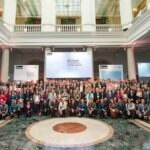The BBVA Foundation brings together 200 Leonardo Grant-winning researchers and cultural creators
After five years of existence, the Leonardo Grants have become a distinguished hallmark in Spain’s research and cultural communities with more than 300 grants awarded, totaling €10.5 million. For the first time, the BBVA Foundation has brought together many of its grant-winning researchers and cultural creators to announce Red Leonardo, an initiative to provide continuity and follow-up to the projects that were made possible by the BBVA grants. The grant program was created to give a boost to a community that had previously not been adequately addressed. Francisco González, president of the BBVA Foundation stressed the importance of innovation in science and culture as “the most powerful tool for addressing the substantial challenges of our time, on both an individual and community level.”

The BBVA Foundation created the Leonardo Grants in 2014 with the aim of supporting researchers and cultural creators during a time when their projects would have lacked sufficient aid: the grants were awarded to people between the ages of 30 and 45, in the middle of their careers, representing a possible inflection point. A community with high growth potential, summoned on to contribute to the scientific and cultural developments of the near future, but lacking the support to be able to fully develop their initiatives.
With an annual budget of €2.2 million, each grant awarded has a maximum value of €40,000. In the first five years of the program, the Foundation has awarded a total of 308 grants amounting to €10.5 million. The selection committees have received and reviewed more than 9,000 applications in the 11 fields of knowledge covered by the program, a clear demonstration of its success.
200 of the Leonardo Grant recipients have come together for the first time at the BBVA Foundation headquarters to celebrate the five-year anniversary of the program and announce the Leonardo Network, an initiative to foster the exchange of ideas and give visibility to the community of researchers and cultural creators who have contributed to the success of the program. The network is an online platform where the progress of its members can be followed. In addition it will act as a source of inspiration for students and scientists alike.
The Leonardo da Vincis of the 21st Century
Famed for his curiosity, constant exploration, and equal interest in science and culture, Leonardo da Vinci (1452-1519) was the inspiration behind the BBVA Foundation grants. During his presentation to the Leonardo alumni, Francisco González underscored the spirit of the grant's namesake: "To expand and innovate in science and culture is the most powerful tool for addressing the substantial challenges of our time, on both an individual and community level.”

Leonardo Grant-winning researchers and cultural creators - BBVA Foundation
According to BBVA Foundation’s president, "if innovation and knowledge have always been essential elements in supporting widespread prosperity, individual rights, and pluralism, its role today is even more critical.” González recalled that although the scholarship program was born "during a context of deep economic crisis" now past, promoting knowledge is more important than ever given "the global appearance — on institutional, social and cultural levels — of the consequences of the crisis."
Successes resulting from the Leonardo Grants include research for the early detection of melanoma metastasis, the creation of a quantum simulator to research new materials, the use of big data to identify the best teaching practices, research into the relationship between climate change and the extinction of species, the search for extrasolar planets, the creation of windows that can generate energy from sunlight, the preemption of religious fundamentalism, etc. Three hundred and eight research and culturally creative initiatives such as these will now coexist in Red Leonardo, waiting for new grant recipients to follow in their footsteps, broadening horizons, and pushing known boundaries.